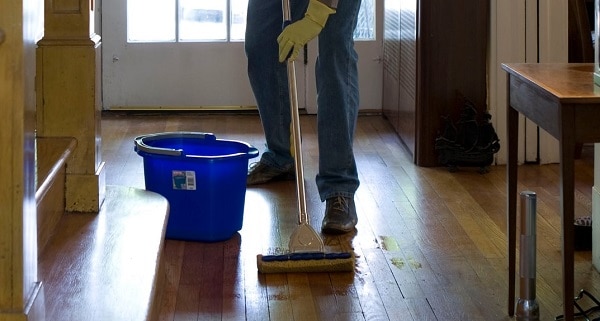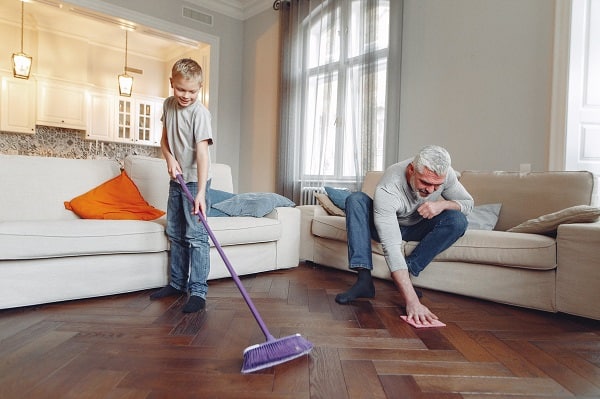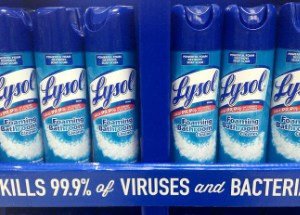Now more than ever, disinfectants are in high demand. Households are improving their hygiene to stop or slow down the spread of viruses, including the highly infectious coronavirus. According to the CDC, anyone who inhales the droplets from an infected person’s cough or sneeze can get sick. The coronavirus can also spread from touching contaminated surfaces or items.
Therefore, many households immediately reach out for their trusted disinfectants. Lysol is a known brand, but is it safe for household use? As an entomologist, I have decided to review Lysol to ascertain whether it is toxic.
Lysol Ingredients, Uses, and Toxicity

Understandably, you have questions about the cleaning advice you read online. With so much misinformation on the internet, it is important to get advice from credible sources. I will help you here. The most important advice I can give is to keep things simple; wash your hands as much as you can, disinfect surfaces, and know how to identify fake news.
The Main Ingredients in Lysol
If you have chosen to use a specific product for sanitizing your house, understand how to use it. Today I will explain what is in Lysol laundry sanitizer, spray, and wipes as listed on the company’s website:
- Ethyl alcohol;
- Butane;
- Propane;
- Quaternary ammonium compounds;
- Sodium bicarbonate;
- Benzalkonium Chloride;
- Water;
- Fragrance.
Benzalkonium chloride is the main ingredient in Lysol. It is known to cause irritant contact dermatitis when it comes into contact with the skin directly and for prolonged hours. This ingredient has brought doubts over the safety of this disinfectant in houses. In 2016, the FDA banned several ingredients used in antiseptic wash products due to their toxicity. Benzalkonium chloride was one of these ingredients; however, the organization later deferred its inclusion to give way for further research.
Other ingredients are known to be very harmful to the environment. Ammonium compounds, for example, present a high risk to aquatic life. They are known to be very toxic for fish. The combination of phenol and ethanol creates a lethal substance for cats that are not able to properly digest these compounds. Using this disinfectant in a household that has pets seems like a risky venture.
[amazon box=”B0093P3O38″ template=”horizontal” tracking_id=”is-lysol-toxic-20″]
Is Lysol Toxic?
So, is Lysol safe for household use? Yes and No. If the disinfectant is used as instructed by the manufacturer, it is very safe. The EPA has listed this product among recommended disinfectants for use against COVID-19. Based on Lysol’s efficacy against hard to kill strong viruses and other diseases similar to coronavirus, the agency has approved its use for the new disease.
When the Lysol products are used as directed, Lysol chemicals kill a majority of deadly germs. The product is also effective against common cold and flu viruses. It can sanitize soft and hard surfaces. Mold and mildew growth is also prevented by cleaning using this disinfectant.
However, the dangers of Lysol are more prevalent when it is misused. The manufacturer clearly states how one should use all the products to sanitize the home and other areas safely. According to the findings of one study, failure to adhere to the instructions will cause one or more of these Lysol spray side effects:
- Skin irritation;
- Respiratory difficulties;
- Allergic reaction;
- Vision impairment.
How to Use Lysol
How should you use the disinfectant spray? You should hold the can upright, about 6 inches away from the surface. In 3 seconds, spray the area you want to disinfect and ensure that it is evenly coated with a mist. Most people do not know this, but the surface should remain coated for about 3 minutes before you air dry it. Letting it coat for up to 10 minutes maximizes the sanitizing effect.
The Lysol website recommends leaving the spray on the surface for up to 10 minutes to kill the stronger viruses. If you are trying to disinfect your child’s toys or surfaces are used in food preparation, extra precaution is needed. Once you have air-dried such surfaces, you must rinse them with fresh water to reduce the Lysol toxicity. The product should not come in direct contact with food, children or pets.
The Lysol wipes are easier to use and offer convenience. Before using them, you should first remove any coating or heavy grease from surfaces. Any all-purpose cleaner with warm water and a cloth will do. The reason for this is that the Lysol wipes do not have enough disinfectant to penetrate solid matter.
Related Post: Is Hydrogen Peroxide a Disinfectant?
Once you have pre-cleaned the surface, you will wipe from top to bottom in s systematic manner. You should use multiple wipes and ensure that the surface is visibly wet and shiny. One wipe covers less than three square feet, so you should make sure all the surfaces have been wiped. The sanitizer should coat the surface for 3-4 minutes.
Instead of wiping away the disinfectant, allow it to air dry. Any surfaces that are in contact with food items should be wiped with a clean, wet towel. If you use the wipes on children’s toys, you should also wipe them with fresh water and a clean towel. Do not flush used wipes down the toilet. They can clog the system. Dispose of them in a dustbin.
[amazon box=”B00J3DO7G8,B0080DTSN4,B00XXKE9XI,B0002LCZ6O” template=”table” tracking_id=”is-lysol-toxic-20″]
What Surfaces Does Lysol Disinfect?
Do you know which surfaces you should sanitize to keep infectious germs away? Certain spots in most households are high transmission areas for germs simply because any people touch them every day. What is in Lysol is effective in killing germs on the following surfaces:
- Door handles and light switches – these are two surfaces at home that every person touches. Although these may not be the first places you would rush to clean on an ordinary cleaning day, this pandemic requires you to pay special attention to them.
- Phones, tablets, and remote controls – these are prone to germs due to constant usage. When using the disinfectant spray, you should cover the speakers and outlet plugs to ensure that they do not get wet.
- Sofas, armchairs, and pillows – many outside clothes and dirty hands touch these surfaces daily. The Lysol disinfectant spray works on soft surfaces just as well as it works on hard ones. Aeration is necessary after using the spray.
- Children’s toys – kids will always shove whatever they can find into their mouths regardless of how dirty this item is. To help keep them safe from infection, you can clean their toys with the spray or wipes. You must always rinse them with clean water after.
Common Questions About Lysol

Despite reading dozens of reviews and buyer’s guides, you may still have a few questions about this disinfectant. I answer the common questions below:
How to Use Lysol Disinfectant Spray?
You should always pre-clean the surface to get rid of soiling and dirt. Holding the bottle at least 6 inches away from you, you will coat the surface evenly. Wiping the disinfectant is not advisable because it needs time to soak. After ten minutes, you should air-dry the surface. If the surface is one that often comes in contact with food or kids, make sure to wipe it with a clean wet towel.
How to Use Lysol Laundry Sanitizer?
Germs can stay for hours on all surfaces, including fabrics. To clean and sanitize your laundry, add this laundry sanitizer to the rinse cycle. It should be added to the fabric softener compartment. Leaving a load of laundry in the rinse cycle for 16 minutes will allow the disinfectant to work effectively.
How Long Does Lysol Last on Surfaces?
The disinfectant should be left on surfaces for at least 3-4 minutes. During this time, the chemicals work effectively to kill all germs. Leaving the disinfectant for longer than 10 minutes is unnecessary as it may rub off on skin and clothes. If you have children or pets in the house, this may pose a significant risk to their wellbeing.
Which Is Better Lysol or Clorox?
According to the EPA, both of these disinfectants are appropriate for killing the coronavirus. When the products are used as per the instructions, they are effective on 99% of bacteria, viruses, and fungi. Some homeowners prefer Lysol due to its multipurpose quality, and the fact that it comes in various scents. Others prefer Clorox because of its strong stain removing qualities.
[amazon box=”B0093P3O38″ template=”horizontal” tracking_id=”is-lysol-toxic-20″]
Final Take
Generally, all surfaces must be disinfected to prevent the spread of germs. However, recent health developments make it necessary to sanitize home surfaces often. Lysol is a great product for disinfecting surfaces as it has been approved by the EPA. Although some of its ingredients can be toxic, they are safe to use in case you follow the manufacturer’s instructions.
Related Post: Is Ammonia a Disinfectant?
Once you have coated a surface with disinfectant, let it soak for a while before air drying. This guarantees that the chemicals have worked. Exercise caution if you have kids and pets in the house by rinsing off any toys and kitchen surfaces after disinfection. Most importantly, rinse your hands well after using these sanitizing products.
References:
- How COVID-19 Spreads (National Center for Immunization and Respiratory Diseases):
https://www.cdc.gov/coronavirus/2019-ncov/prevent-getting-sick/how-covid-spreads.html?CDC_AA_refVal=https%3A%2F%2Fwww.cdc.gov%2Fcoronavirus%2F2019-ncov%2Fprepare%2Ftransmission.html - LYSOL® Laundry Sanitizer (Smart Label):
http://www.rbnainfo.com/smart-label.php?productLineId=1833 - FDA issues final rule on safety and effectiveness of antibacterial soaps (U.S. Food & Drug Administration):
https://www.fda.gov/news-events/press-announcements/fda-issues-final-rule-safety-and-effectiveness-antibacterial-soaps - List N: Disinfectants for Coronavirus (COVID-19) (U.S. Environmental Protection Agency):
https://www.epa.gov/pesticide-registration/list-n-disinfectants-coronavirus-covid-19 - Update on asthma and cleaners(US National Library of Medicine
National Institutes of Health):
https://www.ncbi.nlm.nih.gov/pmc/articles/PMC3125175/ - Does Lysol Kill the COVID-19 virus? (Lysol):
https://www.lysol.com/clean-and-protect/protect-against-germs/covid-19-resources/does-lysol-kill-covid-19

